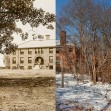Historical Materials
School Courtyard
View of the courtyard behind the school building (right) and gymnasium (left).
Second Floor Classroom
A classroom on the second floor of the School Building, taken circa 1903. The boys are learning spelling by dictation. The building was heavily renovated in later years, but its iconic roof line can clearly be seen in the window.
Short History by Daly
History of the Walter E. Fernald Development Center, by Marie E. Daly. PDF, 4 pages.
Shriver Center Opening
An article on the opening of the Shriver Center from The Boston Globe, January 14, 1966.
Storeroom
A view of the Storeroom Building, which was originally used as a power plant and laundry for the school in 1891.
Students in Gymnasium
Students inside the Fernald gymnasium circa 1903, contrasted with a contemporary view after the school's closure. Marching to drums and music was considered an important activity, as children with a wide range of ability could follow the beats and repetitive motions.
Trench Diggers
Fernald boys dig a new water main to the schoolhouse and gymnasium in the background, circa 1903.
Utility Map
This map illustrates the water and steam connections in the central portion of the campus. Discovered by the recordation team in Howe Library, the item had suffered major damage from neglect. Observing the buildings shown and their modifications, we can surmise that the map dates to 1918-1921.
Warren Hall and South Nurses' Home
A view of Warren Hall (left) and South Nurses Home (right). Warren Hall was a dormitory for girls, while South Nurses served as a residence for Fernald staff. Both were built circa 1906-1907.
Waverley
View of Waverley Hall, the original administration building constructed in 1891.
West Nurses Entrance
Entrance to the West Nurses Home, viewed from a lawn that was later used as a playground. West Nurses was built in 1905 for the women working in the western campus, mainly used for female residents during Fernald's early years.
Wheatley Ward
A room inside Wheatley Hall, built in 1933. This was originally the school's nursery, caring for the youngest and most fragile children and infants at the institution. The building was converted to a furniture repair shop in later years.











